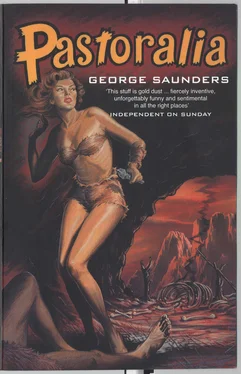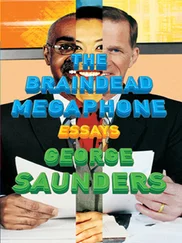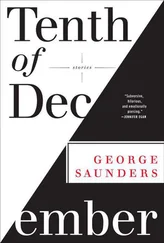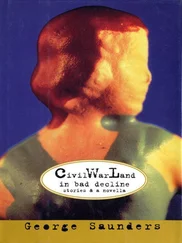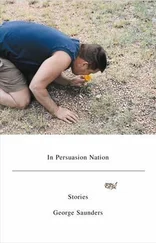From behind him on the path came a series of arrhythmic whacking steps. He glanced back to find Aldo Cummings, an odd duck who, though nearly forty, still lived with his mother. Cummings didn’t work and had his bangs cut straight across and wore gym shorts even in the dead of winter. Morse hoped Cummings wouldn’t collar him. When Cummings didn’t collar him, and in fact passed by without even returning his nervous, self-effacing grin, Morse felt guilty for having suspected Cummings of wanting to collar him, then miffed that Cummings, who collared even the City Hall cleaning staff, hadn’t tried to collar him. Had he done something to offend Cummings? It worried him that Cummings might not like him, and it worried him that he was worried about whether a nut like Cummings liked him. Was he some kind of worrywart? It worried him. Why should he be worried, when all he was doing was going home to enjoy his beautiful children without a care in the world, although on the other hand there was Robert’s piano recital, which was sure to be a disaster, since Robert never practiced and they had no piano and weren’t even sure where or when the recital was and Annie, God bless her, had eaten the cardboard keyboard he’d made for Robert to practice on. When he got home he would make Robert a new cardboard keyboard and beg him to practice. He might even order him to practice. He might even order him to make his own cardboard keyboard, then practice, although this was unlikely, because when he became forceful with Robert, Robert blubbered, and Morse loved Robert so much he couldn’t stand to see him blubbering, although if he didn’t become forceful with Robert, Robert tended to lie on his bed with his baseball glove over his face.
Good God, but life could be less than easy, not that he was unaware that it could certainly be a lot worse, but to go about in such a state, pulse high, face red, worried sick that someone would notice how nervous one was, was certainly less than ideal, and he felt sure that his body was secreting all kinds of harmful chemicals and that the more he worried about the harmful chemicals the faster they were pouring out of wherever it was they came from.
When he got home, he would sit on the steps and enjoy a few minutes of centered breathing while reciting his mantra, which was Calm Down Calm Down, before the kids came running out and grabbed his legs and sometimes even bit him quite hard in their excitement and Ruth came out to remind him in an angry tone that he wasn’t the only one who’d worked all day, and as he walked he gazed out at the beautiful Taganac in an effort to absorb something of its serenity but instead found himself obsessing about the faulty latch on the gate, which theoretically could allow Annie to toddle out of the yard and into the river, and he pictured himself weeping on the shore, and to eradicate this thought started manically whistling “The Stars and Stripes Forever,” while slapping his hands against his sides.
Cummings bobbed past the restored gristmill, pleased at having so decisively snubbed Morse, a smug member of the power elite in this conspiratorial Village, one of the league of oppressive oppressors who wouldn’t know the lot of the struggling artist if the lot of the struggling artist came up with great and beleaguered dignity and bit him on the polyester ass. Over the Pine Street bridge was a fat cloud. To an interviewer in his head, Cummings said he felt the possible rain made the fine bright day even finer and brighter because of the possibility of its loss. The possibility of its ephemeral loss. The ephemeral loss of the day to the fleeting passages of time. Preening time. Preening nascent time, the blackguard. Time made wastrels of us all, did it not, with its gaunt cheeks and its tombly reverberations and its admonishing glances with bony fingers. Bony fingers pointed as if in admonishment, as if to say, “I admonish you to recall your own eventual nascent death, which, being on its way, human, is forthcoming. Forthcoming, mortal coil, and don’t think its ghastly pall won’t settle on your furrowed brow, pronto , once I select your fated number from my very dusty book with this selfsame bony finger with which I’m pointing at you now, you vanity of vanities, you luster, you shirker of duties, as you shuffle after your worldly pleasure centers.”
That was some good stuff, if only he could remember it through the rest of his stroll and the coming storm, to scrawl in a passionate hand on his yellow pad. He thought with longing ardor of his blank yellow pad, he thought. He thought with longing ardor of his blank yellow pad, on which, this selfsame day, his fame would be wrought, no— on which, this selfsame day, the first meager scrawlings which would presage his nascent burgeoning fame would be wrought, or rather writ, and someday someone would dig up his yellow pad and virtually cry eureka when they realized what a teeming fragment of minutia, and yet crucial minutia, had been found, and wouldn’t all kinds of literary women in short black jackets want to meet him then!
In the future he must always remember to bring his pad everywhere.
The town had spent a mint on the riverfront, and now the burbling, smashing Taganac ran past a nail salon in a restored gristmill and a café in a former coal tower and a quaint public square where some high school boys with odd haircuts were trying to kick a soccer ball into the partly open window of a parked Colt with a joy so belligerent and obnoxious that it seemed they believed themselves the first boys ever to walk the face of the earth, which Morse found worrisome. What if Annie grew up and brought one of these freaks home? Not one of these exact freaks, of course, since they were approximately fifteen years her senior, although it was possible that at twenty she could bring home one of these exact freaks, who would then be approximately thirty-five, albeit over Morse’s dead body, although in his heart he knew he wouldn’t make a stink about it even if she did bring home one of the freaky snots who had just succeeded in kicking the ball into the Colt and were now jumping around joyfully bumping their bare chests together while grunting like walruses, and in fact he knew perfectly well that, rather than expel the thirty-five-year-old freak from his home, he would likely offer him coffee or a soft drink in an attempt to dissuade him from corrupting Annie, who for God’s sake was just a baby, because Morse knew very well the kind of man he was at heart, timid of conflict, conciliatory to a fault, pathetically gullible, and with a pang he remembered Len Beck, who senior year had tricked him into painting his ass blue. If there had actually been a secret Blue-Asser’s Club, if the ass-painting had in fact been required for membership, it would have been bad enough, but to find out on the eve of one’s prom that one had painted one’s ass blue simply for the amusement of a clique of unfeeling swimmers who subsequently supplied certain photographs to one’s prom date, that was too much, and he had been glad, quite glad actually, at least at first, when Beck, drunk, had tried and failed to swim to Foley’s Snag and been swept over the Falls in the dark of night, the great tragedy of their senior year, a tragedy that had mercifully eclipsed Morse’s blue ass in the class’s collective memory.
Two redheaded girls sailed by in a green canoe, drifting with the current. They yelled something to him, and he waved. Had they yelled something insulting? Certainly it was possible. Certainly today’s children had little respect for authority, although one had to admit there was always Ben Akbar, their neighbor, a little Pakistani genius who sometimes made Morse look askance at Robert. Ben was an all-state cellist, on the wrestling team, who was unfailingly sweet to smaller kids and tole-painted and could do a one-handed push-up. Ah, Ben Shmen, Morse thought, ten Bens weren’t worth a single Robert, although he couldn’t think of one area in which Robert was superior or even equal to Ben, the little smarty-pants, although certainly he had nothing against Ben, Ben being a mere boy, but if Ben thought for a minute that his being more accomplished and friendly and talented than Robert somehow entitled him to lord it over Robert, Ben had another think coming, not that Ben had ever actually lorded it over Robert. On the contrary, Robert often lorded it over Ben, or tried to, although he always failed, because Ben was too sharp to be taken in by a little con man like Robert, and Morse’s face reddened at the realization that he had just characterized his own son as a con man.
Читать дальше
